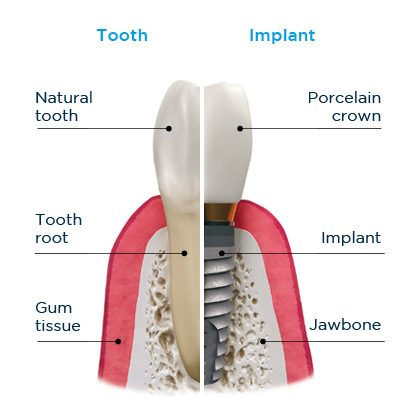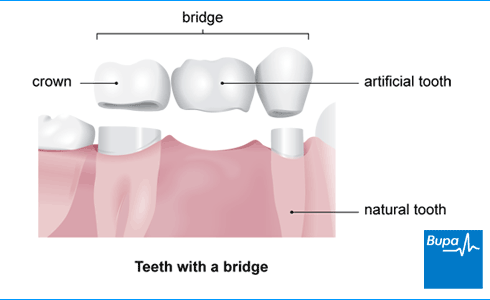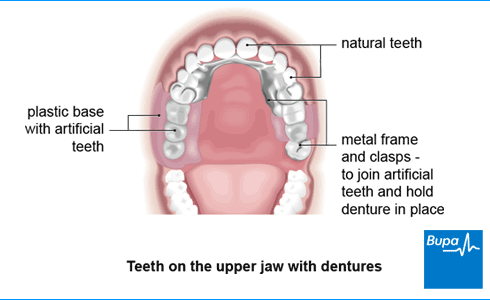Missing teeth
- Dr Emma Ajimoko, Head of Clinical Policy and Standards at Bupa Dental Care
- Michelle Harrison, Freelance Health Editor
A tooth removal is a procedure to take your tooth out completely. It’s only done when absolutely necessary, like if your tooth is severely infected or damaged and can’t be saved with other treatments. If you do need a tooth removal, your dentist will explain your options to replace it.
About missing teeth
Missing teeth can make your smile look different and impact your confidence. They can also make it more difficult to eat and speak, and may affect the health of your other teeth. If you’re missing teeth, it’s a good idea to see a dentist. There are things they can do to fix missing teeth, helping to restore the way your teeth look and work for years to come.
What causes missing teeth?
There are lots of reasons your teeth might be missing. Here are some examples.
- An injury. If you get hit in the face, for example from playing sports, a car accident or fall, your teeth might get knocked out. If this happens, seek emergency help from a dentist straight away.
- Gum disease. Inflammation and infection around your gums can weaken the bones that hold your teeth in place, causing them to loosen and fall out.
- Tooth decay. This is when sugar and bacteria cause holes to develop in your teeth. If tooth decay isn’t treated, it can eventually lead to tooth loss.
- Genetic conditions. If you’re born with a medical condition like a cleft lip or Down syndrome, some of your adult teeth might never develop.
- Dental treatment. If you’re having dental treatment for something else, like a badly damaged or infected tooth, but your tooth can’t be saved, your dentist may need to remove it completely.
When to seek emergency dental help
If your tooth has been knocked out in an accident, call a dentist as soon as possible and ask for an emergency appointment. If you can’t get an urgent appointment, call NHS 111 for help and advice – you can call at any time of day.
In the meantime, pick up your tooth by the top (crown) not by the root, and gently rinse it with water. Try to place your tooth back in its socket. But if you can’t, keep it in a pot of milk or saliva, or hold it in your mouth until you get to the dentist.
How to replace missing teeth
A dentist can discuss all the tooth replacement options with you. Missing tooth options might include the following.
Dental implants
A dental implant is a small titanium screw that’s placed in your jaw where the root of your old tooth used to be. It acts as a strong base for your dentist to attach a false tooth (crown) on top of.
Getting a dental implant means having surgery on your mouth. The process usually takes a few months and several appointments to complete. This is because it takes time for your new implant to fully embed into your jawbone before your replacement tooth can be fitted to the top. A dental implant is usually more expensive than other types of tooth replacement. But once it's in place, a dental implant looks just like a natural tooth. With good care, implants can last for many years.

Dental bridge
A dental bridge is a false tooth that’s held in place by cementing it to the teeth on either side. It bridges the gap left by a missing tooth.
Unlike dental implants, getting a dental bridge doesn’t require surgery, but it does involve a few appointments and changes to your existing teeth. Cleaning around the bridge can be tricky, which might lead to plaque build-up. But dental bridges look and feel like your natural teeth and help to keep your other teeth from shifting.

Partial and complete dentures
Dentures are custom-made false teeth used to fill the gaps left by missing teeth. They’re usually made of a pink base that fits over your gums, with artificial teeth attached. .If you need to replace an entire row of teeth, your dentist may suggest you have complete dentures. But if you only need to replace some of your teeth, they may recommend partial dentures.
Dentures can look very natural and help with chewing and speaking, but some people might find them a bit uncomfortable at first. They need to be taken out and cleaned daily, and removed at night, so they’re more likely to become damaged than implants or bridges. But they’re also cheaper and easier to repair.

Complications of missing teeth
Over time, missing teeth can lead to other problems. Here are some examples.
- Low confidence. Gaps in your smile can affect how you feel about your appearance.
- Difficulty eating. Chewing and biting may become harder without certain teeth.
- Speech problems. Missing teeth can make it difficult to pronounce certain words clearly.
- Changes to the shape of your face. Gaps can gradually change the shape of your face and cause your mouth to sag.
- Bone loss. The bone in your jaw might start to wear away where teeth are missing.
- Misaligned teeth. Your remaining teeth can stop lining up properly and move into the spaces left. This can lead to jaw pain, teeth grinding, tooth decay and sensitivity.
Prevention of missing teeth
You can’t always prevent a tooth from falling out, especially if it happens because of an accident. But there are steps you can take to reduce the chances of it happening.
- Wear a mouth guard if you play contact sports like rugby or boxing.
- Take good care of your teeth to prevent tooth decay and gum disease.
- Visit your dentist regularly so they can spot and treat any problems early.

More on this topic
Other helpful websites
This information was published by Bupa's Dental Content Team and is based on reputable sources of medical evidence. It has been reviewed by appropriate medical or clinical professionals and deemed accurate on the date of review. Photos are only for illustrative purposes and do not reflect every presentation of a condition.
Any information about a treatment or procedure is generic, and does not necessarily describe that treatment or procedure as delivered by Bupa or its associated providers.
The information contained on this page and in any third party websites referred to on this page is not intended nor implied to be a substitute for professional medical advice nor is it intended to be for medical diagnosis or treatment. Third party websites are not owned or controlled by Bupa and any individual may be able to access and post messages on them. Bupa is not responsible for the content or availability of these third party websites. We do not accept advertising on this page.
- Rakhshan V. Congenitally missing teeth (hypodontia): a review of the literature concerning the etiology, prevalence, risk factors, patterns and treatment. Dent res J (Isfahan) 2015; 12(1): 1-13. doi: 10.4103/1735-3327.150286
- Hemmings K, Griffiths B et al. Improving occlusion and orofacial aesthetics: tooth repair and replacement. BMJ 2000; 321(7258): 438-41. doi: 10.1136/bmj.321.7258.438
- Dental implants and how crucial replacing teeth really is. Oral Health Foundation. dentalhealth.org, published June 2017
- Caring for your mouth after a dental injury. British Association of Oral and Maxillofacial Surgeons. baoms.org.uk, accessed September 2024
- Periodontal (gum) disease. National Institute of Dental and Craniofacial Research. nidcr.nih.gov, last reviewed August 2021
- Tooth decay. National Institute of Dental and Craniofacial Research. nidcr.nih.gov, last reviewed August 2024
- Tooth extraction: Simple vs. surgical tooth removal. American Academy of Oral and Maxillofacial Surgeons. myoms.org, last updated June 2019
- Knocked-out tooth. NHS. nhs.uk, last reviewed August 2021
- Majewski M, Kostrzewska P, Ziolkowska S et al. Traumatic dental injuries – practical management guide. Pol Merkur Lekarski 2022; 50(297): 216-18
- Fractured, loosened or knocked-out teeth. MSD Manuals. msdmanuals.com, last reviewed/revised June 2023
- Implants. Oral Health Foundation. dentalhealth.org, accessed September 2024
- Bridges and partial dentures. Oral Health Foundation. dentalhealth.org, accessed September 2024
- Dental appliances. MSD manuals. msdmanuals.com, last reviewed/revised Jan 2023
- Mark AM. Replacing missing or lost teeth. American Dent Assoc 2021; 152(5): 412
- Mouthguards. Oral Health Foundation. dentalhealth.org, accessed September 2024
- Mark AM. Preventing tooth loss. American Dent Assoc 2020; 151(9): 712
![]()
Our information has been awarded the PIF tick for trustworthy health information.
^ We may record or monitor our calls.
Bupa Dental Care is a trading name of Oasis Dental Care Limited. Registered in England and Wales No: 00478127. Registered office: Bupa Dental Care, Vantage Office Park, Old Gloucester Road, Hambrook, Bristol, United Kingdom BS16 1GW.
Oasis Dental Care Limited has a number of trading names including Bupa Dental Care. Please see the list of our different trading names.


